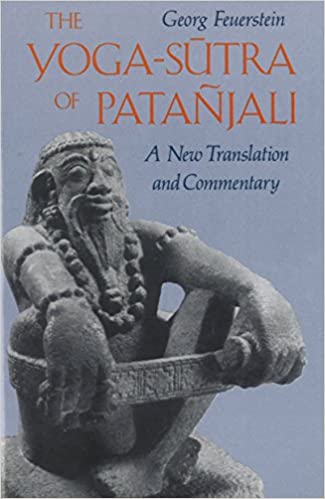Why is yoga philosophy essential for your practice?
The word yoga usually means physical postures. Most yoga classes are taught with the physical body in the foreground. Most of what the teacher says during class, sometimes called cues, instructs the student how to move their body.
But what is the background of yoga? What can we learn by exploring the profound philosophy of this ancient discipline? How can this philosophy inform and uplift our asana practice? Inform and uplift our lives?
When you just focus on your body, and ignore the study of yoga philosophy, you miss out on a vast depth of study that brings sweetness to your practice. It’s like going on a roadtrip without a map.
So is yoga philosophy still relevant today? Absolutely.
Sure, we live in an era of jet engines, climate change, and social media, but the insights of yoga philosophy – about the nature of the mind and how to find relief from the suffering we cause ourselves – could not be more urgent.
Join us to explore the rich philosophical underpinnings of yoga. We'll concentrate on a single key text: The Yoga Sutra of Patanjali.
What is the Yoga Sutra of Patanjali?
"The Yoga Sutra of Patanjali is a collection of Sanskrit sutras (aphorisms) on the theory and practice of yoga. They were compiled in the early centuries CE, by the sage Patanjali in India who synthesized and organized knowledge about yoga from much older traditions.” Read more here.
One of the foundational texts for our modern practice, Patanjali writes about what prevents us from entering the state of yoga. This text, philosophical yet deeply practical, offers a guide to Sadhana - your spiritual path home to yourself.
 Yoga Sutra of Patanjali translated by Georg Feuerstain
Yoga Sutra of Patanjali translated by Georg Feuerstain
Learn at your own speed
with immediate access to the entire course.
-
Begin as soon as you enroll.
-
Enjoy the 6 pre-recorded (30-45 minute) audio conversations. No rush!
-
Watch the 3 (two-hour) recorded classes on your own schedule.
-
Ask questions via our private forum. No Facebook required!
-
Practice Savasana with the guided Restorative Setup.
-
Take 12 spacious months to access the course material.
Why study with Judith and Lizzie?




Teacher and Host
Ph.D., Physical Therapist Judith Hanson Lasater
Yoga Content Creator Lizzie Lasater
Lizzie Lasater began teaching Vinyasa Yoga in 2005, before earning a Masters in Architecture from Columbia University.
She lives in Salzburg with her partner and twin boys where she produces online yoga courses, leads retreats, writes a free Sunday self-care newsletter, and designs spirit jewelry.
Course curriculum
-
-
We're so glad you're here
-
Reading list from Judith
-
-
-
Lesson 1: Ancient Wisdom Modern Lives
-
Lesson 2: Practice
-
Lesson 3: Asana
-
Lesson 4: Breath
-
Lesson 5: Focus
-
Lesson 6: Integration
-
-
-
Session 1: Recording
-
Session 2 : Recording
-
Session 3: Recording
-
-
-
Restorative Savasana Set-Up
-
Guided Savasana
-
-
-
Recommitting to Living the Yamas, Part 1
-
Recommitting to Living the Yamas, Part 2
-
-
-
Certificate for 20 Hours
-

About this course
- $299.00
- 16 lessons
- 6 hours of video content
Students Love Learning with Judith and Lizzie
The 5-star reviews speak for themselves.
Loved this Course!
Heather
I cannot say enough good things about this course. I loved every part of it.
I cannot say enough good things about this course. I loved every part of it.
Read LessAll I Hoped For
Karen
This course was all that I hoped it would be.
This course was all that I hoped it would be.
Read LessSo Valuable
Susan
The restorative practices, notes, and recordings are so valuable.
The restorative practices, notes, and recordings are so valuable.
Read LessRich in Material
Susan
Grateful to have these teachings available for a lifetime.
Grateful to have these teachings available for a lifetime.
Read LessAccessible
Deborah
Judith has the ability to translate the sutras by putting flesh and blood on them.
Judith has the ability to translate the sutras by putting flesh and blood on them.
Read LessPocket Patanjali
Nancy
An incredible course that inspired my life and practice.
An incredible course that inspired my life and practice.
Read LessFabulous
Shelly
Take this course. You won't regret it!
Take this course. You won't regret it!
Read LessCuriosity Unlocked
Kath
I found the discussions to interesting, relevant and heartfelt.
I found the discussions to interesting, relevant and heartfelt.
Read LessGratitude
Gwenaelle
Thank you for these teachings! It is a pleasure to learn from this team.
Thank you for these teachings! It is a pleasure to learn from this team.
Read LessOutstanding!!
Stephen
This Patanjali Philosophies content and additional audio content was simply outstanding.
This Patanjali Philosophies content and additional audio content was simply outstanding.
Read LessCompelling
Heather
This course was so thoughtfully designed. I was able to listen in at my own pace and deeply comprehend.
This course was so thoughtfully designed. I was able to listen in at my own pace and deeply comprehend.
Read LessFAQ
-
What is your refund policy?
We offer a 95% refund policy. Just email us within one week of enrolling, and we can reverse the charge (minus third party credit card fees) back onto your credit card. No questions asked.
-
Can I receive Yoga Alliance credit?
Yes! We are a Yoga Alliance Continuing Education Provider. At the end of the course you will receive a certificate of completion for 20 non-contact hours. After that, you can request continuing education credit from Yoga Alliance or an equivalent organization.
-
When does my course access expire?
Relax and take your time - that's the digital advantage. You have unlimited access to the Practicing Patanjali material for one full year.
-
Do I need to purchase additional materials?
We suggest you have at least one translation of the 'Yoga Sutra of Patanjali'. Students also receive a list of Judith's favorite sutra translations and suggested further reading.
-
Can I ask questions during the course?
Yes, you can submit questions for Judith and Lizzie to answer directly through our private forum. No Facebook required!
-
My question hasn't been answered. Who can I contact?
Lizzie is here to answer your enrollment questions. Please email her directly at [email protected]
Enrollment options
Two ways to join the learning adenture:
-
Get started now
$299.00
Single payment
-
Get started now
2 x $150
Payment Plan
